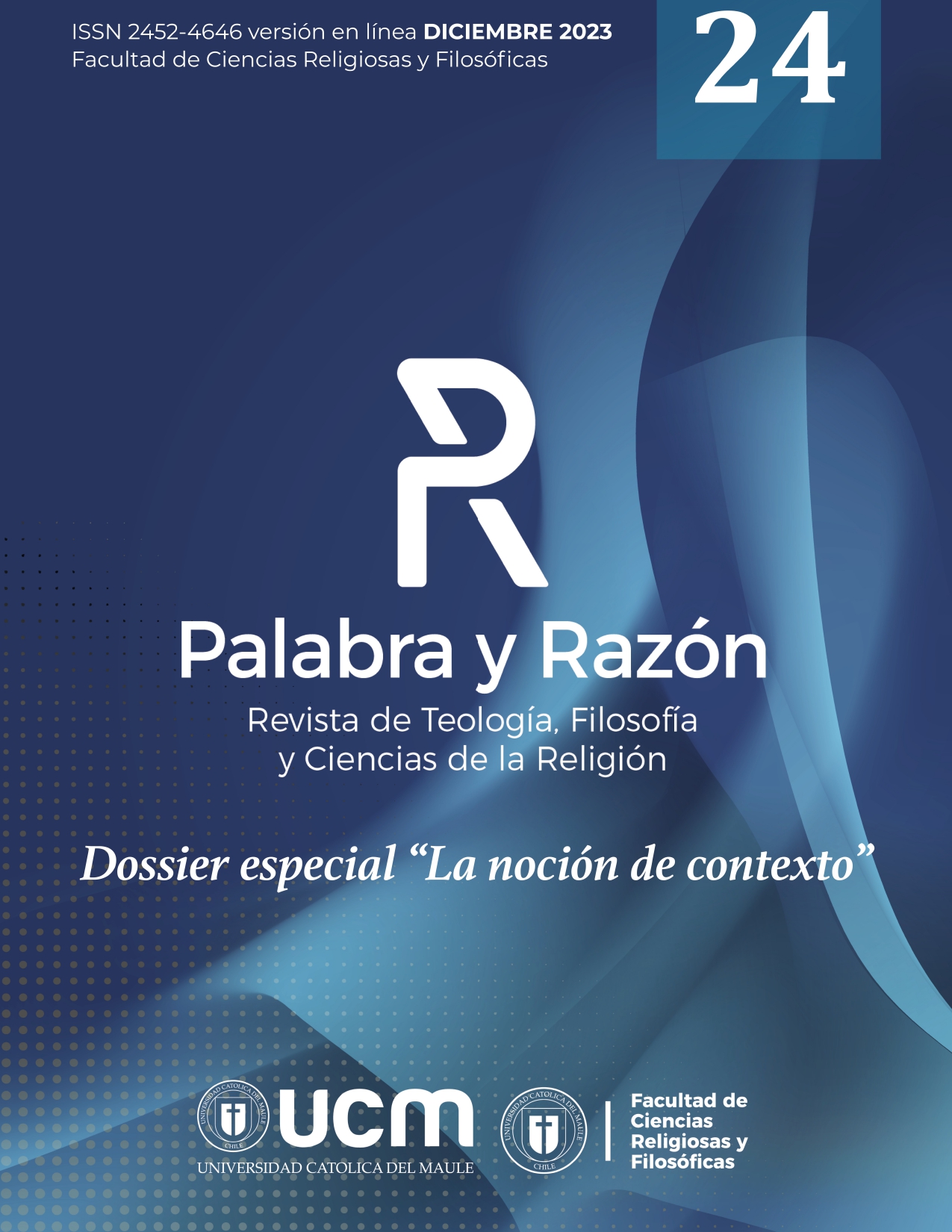Contextualismo epistemológico Problemas y desafíos
Contenido principal del artículo
Resumen
Detalles del artículo
Baumann, P. (2008). Contextualism and the factivity problem. Philosophy and Phenomenological Research, 76(3), 580-602.
Baumann, P. (2016). Epistemic Contextualism. A Defense. Oxford University Press.
Boghossian, P. (1996). Analyticity Reconsidered. Nous, 30, 360-91.
Boghossian, P. (2006). Fear of knowledge. Clarendon Press.
Brendel, E. & Jäger, C. (2004). Contextualist approaches to epistemology:problems and prospects. En Contextualisms in Epistemology (pp. 1-30).Springer.
Brendel, E. (2009). Contextualism, relativism, and factivity: Analyzing ‘knowledge’ after the new linguistic turn in epistemology. Reduction and Elimination in Philosophy and the Sciences, 403-416. Ontos Verlag.
Carnap, R. (1950). Empiricism, Semantics and Ontology. Revue International de Philosophie, 4, 20-40; repr. in Carnap 1956, 205-221.
Carnap, R. (1956). Meaning and Necessity. 2a ed. University of Chicago Press.
Cohen, S. (1986). Knowledge and context. The Journal of Philosophy, 83(10),574-583.
Cohen, S. (1988). How to be a Falibilist. Philosophical Perspectives, 2, 91-123.
Cohen, S. (1999). Contextualism, Skepticism, and the Structure of Reasons. Philosophical Perspectives, 13, 57-89.
Cohen, S. (2001). Contextualism Defended: Comments on Richard Feldman’s Skeptical Problems, Contextualist Solutions. Philosophical Studies, 103, 87-98.
Davidson, D. (2003). Subjetivo, intersubjetivo, objetivo. Trad. Fernández Prat, O. Cátedra.
DeRose, K. (1992). Contextualism and Knowledge Attributions. Philosophy and Phenomenological Research, 52, 913-29.
DeRose, K. (1999). Contextualism: An explanation and defense. The Blackwell guide to epistemology (pp. 187-205), Wiley-Blackwell.
DeRose, K. (2009). The Case for Contextualism: Knowledge, Skepticism, and Context. Vol. 1. Clarendon Press.
Dretske, F. (2005). The Case Against Closure. En Steup, M. & Sosa, E. (eds.), Contemporary Debates in Epistemology (pp. 27-40). Wiley-Blackwell.
Fogelin, R. (1985). The Logic of Deep Disagreements. Informal Logic, 7(1), 1-8. Reprinted in Informal Logic, 25, 3-11 (2005).
Fogelin, R. (1994). Pyrrhonian Reflections on Knowledge and Justification. Oxford University Press.
Fogelin, R. (2019). La lógica de los desacuerdos profundos (2005 [1985]). Trad. de D. Mejía Saldarriaga. Revista Iberoamericana de Argumentación. RIA, 19, 84-99. Doi: 10.15366/ria2019.19.004
Fricker, M. (2017). Injusticia epistémica. Herder Editorial.
García-Arnaldos, M. D. (2019). El problema de la justificación del conocimiento básico. Anales del Seminario de Historia de la Filosofía, 36(1), 243-259.
Greenough, P. & Kindermann, D. (2017). The Semantic Error Problem for Epistemic Contextualism. En J. Jenkins Ichikawa (ed.), The Routledge Handbook of Epistemic Contextualism (pp. 305-320). Routledge.
Habermas, J. (2002). Verdad y justificación. Trad. P. Fabra y L. Díez. Trotta.
Hofweber, T. (1999). Contextualism and the meaning-intention problem. En Cognition, Agency and Rationality: Proceedings of the Fifth International Colloquium on Cognitive Science (pp. 93-104). Springer Netherlands.
Ichikawa, J. J. (2017). Introduction: What is epistemic contextualism? En The Routledge handbook of epistemic contextualism (pp. 1-10). Routledge.
Kusch, M. (2004) Knowledge by Agreement. The Programme of Communitarian Epistemology. Oxford University Press.
Lewis, D. (1986). On the Plurality of Worlds. Blackwell, Oxford and New York.
Lewis, D. (1996). Elusive Knowledge. Australasian Journal of Philosophy, 74, 549-67. Reprinted in Lewis (1999), 418-45.
Lynch, M. P., Wyatt, J., Kim, J. & Kellen, N. (eds.). (2021). The nature of truth: Classic and contemporary perspectives. MIT Press.
MacFarlane, J. (2005). The Assessment Sensitivity of Knowledge Attributions. Oxford Studies in Epistemology, 1, 197-233.
MacFarlane, J. (2014). Assessment Sensitivity: Relative Truth and Its Applications. Oxford University Press.
Pritchard, D. (2002). Two Forms of Epistemological Contextualism. Grazer Philosophische Studien, 64, 19-55
Quesada, D. (coord.). (2009). Cuestiones de teoría del conocimiento. Tecnos.
Quine, W. V. O. (1936). Truth by convention. En Philosophical essays for Alfred North Whitehead. Longman, Green, & Company Inc.
Rayo, A. (2013a). The Construction of Logical Space. Oxford University Press.
Rayo, A. (2013b). A plea for semantic localism. Noûs, 647-679.
Rayo, A. (2014). Reply to critics. Inquiry, 57(4), 498-534.
Rysiew, P. (2021). Epistemic Contextualism. The Stanford Encyclopedia of Philosophy, E. N. Zalta (ed.). https://plato.stanford.edu/archives/spr2021/entries/contextualism-epistemology/
Russell, G. (2014). Hybrid identities and just being yourself. Inquiry, 57(4), 455-465.
Schiffer, S. (1996). Contextualist solutions to scepticism. En Proceedings of the Aristotelian Society (Vol. 96, pp. 317-333). Aristotelian Society, Wiley.
Stine, G. (1976). Skepticism, Relevant Alternatives, and Deductive Closure. Philosophical Studies, 29(4), 249-261.
Stalnaker, R. C. (1999). Context and content: Essays on intentionality in speech and thought. Clarendon Press.
Stanley, J. (2005). Knowledge and Practical Interests. Oxford University Press.
Stuardo, S. (2019, 21 de septiembre). El motivo de por qué es tan ofensivo que llames “pascuenses” a la gente de Rapa Nui. Biobiochile. https://www.biobiochile.cl/noticias/sociedad/curiosidades/2019/09/21/el-motivode-por-que-es-tan-ofensivo-que-llames-pascuenses-a-la-gente-derapa-nui.shtml
Unger, P. (1984). Philosophical relativity. Basil Blackwell.
Williams, M. (1977). Groundless Belief. Basil Blackwell. También: Williams, M. (1999b). Groundless Belief: an essay on the possibility of epistemology. Princeton University Press.
Williams, M. (1991). Unnatural Doubts. Basil Blackwell.
Williams, M. (1999a). Skepticism. En Greco, J. & Sosa, E. (eds.), The Blackwell Guide to Epistemology. Blackwell.
Williams, M. (2001). Problems of Knowledge. Oxford University Press.
Williams, M. (2007). Why (Wittgensteinian) contextualism is not relativism. Episteme, 4(1), 93-114.
Williamson, T. (2000). Knowledge and its Limits. Oxford University Press.
Williamson, T. (2005). Contextualism, Subject-Sensitive Invariantism and Knowledge of Knowledge. The Philosophical Quarterly, 55(219), 213-35.
Wittgenstein, L. (1953/1958). Philosophical Investigations. Trans. G. E. M. Anscombe, Englewood Cliffs, N. J., Prentice Hall. (Investigaciones Filosóficas, trad. Alfonso García Suárez y Ulises Moulines, Crítica, 1988).
Wittgenstein, L. (1969). On Certainty. Ed. G. E. M. Anscombe & G. H. von Wright. Trans. G. E. M Anscombe & Denis Paul. Blackwell. (Sobre la Certeza, trad. Josep L. Prades y Vicent Raga, Gedisa, 2000).
Wright, C. (2004). Warrant for nothing (and foundations for free)? Aristotelian Society Supplementary Volume (Vol. 78, No. 1, pp. 167-212). University College London: The Aristotelian Society.
Wright, C. (2005). Contextualism and Skepticism: Even-Handedness, Factivity, and Surreptitiously Raising Standards. The Philosophical Quarterly, 55(219), 236-62.
Wright, C. (2017). The variability of ‘knows’: An opinionated overview. The Routledge Handbook of Epistemic Contextualism, 13-31.

Esta obra está bajo una licencia de Creative Commons Reconocimiento-NoComercial-CompartirIgual 4.0 Internacional

